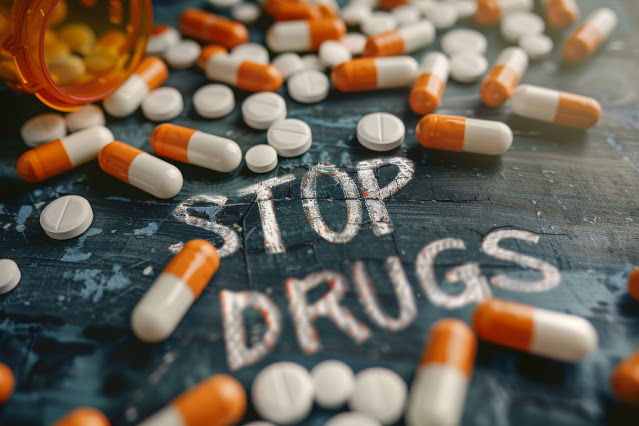Understanding Alcohol Detox: A Comprehensive Guide to Recovery
The first step in overcoming alcoholism is detoxing. Anyone starting this road must know what it is, how it works, and its benefits. At RehabsIndia, we aim to help people find the best de addiction centres in india.
What makes alcohol so addicting?
Alcoholism is a tough issue because it involves both mental
and physical dependence. It is called dopamine, and it makes you feel good and
calm. Alcohol changes the brain's reward system by making more dopamine
available. This reaction makes people feel temporarily happy, which makes them
want to drink more and more to feel the same way.
As time goes on, the body becomes less sensitive to alcohol, so it takes more of it to have the same effects. As this dependence grows, it can quickly turn into addiction as the brain becomes dependent on alcohol for joy and stress relief. Understanding these processes makes it clear why detox is so necessary for stopping the cycle of alcoholism.
What You Need to Do to Get Rid of Alcohol?
There are several steps to this process, and the intensity
can change depending on the person's health and level of dependence. Without
booze, detox lets the body get back to its natural balance, but it often comes
with withdrawal symptoms that can be hard to deal with.
Alcohol Detox Has These Parts:
Phase 1: The first step in detox is to stop drinking
alcohol. Withdrawal symptoms may happen as the body gets used to not having
booze. Most of the time, the worst part happens in the first 48 hours to a
week.
Phase 2. Signs of withdrawal: Headaches, feeling sick,
throwing up, sweating, not wanting to eat, attacks of panic, false belief, anxiety,
insomnia, irritability, and tremors are some of the most common signs. These symptoms
are a normal part of the detox process for the body to reset itself.
Phase 3: Detox for Health
Medical detox includes taking prescribed drugs and being supervised by a doctor to ease withdrawal symptoms and keep you safe. Doctors and nurses are essential for controlling symptoms and avoiding problems.
Additional Help for a Successful Detox
It is not enough to detox to get better in the long run. A
comprehensive method that includes extra help is necessary for a smooth
sobriety transition. Some essential parts of extra help are:
- Nutritional Support: Getting enough water and food
to restore nutrients is essential during detox.
- Exercise: Being active regularly is good for your
health and helps you get better.
- Counseling and therapy: Dealing with the mental parts of addiction in therapy helps people figure out why they are addicted, learn new ways to deal with their feelings, and control their cravings.
Alcohol detox programs at best de addiction centres in
India have many benefits
Alcohol detox programs at best
luxury rehab centres in India give people who want to beat their addiction
a structured and helpful place to be.
Safety: Detox programs are made to help people deal
with withdrawal symptoms by giving medical supervision and help for any
problems that might come up.
Mental Health Support: During detox at best de
addiction centres in India, having access to trained doctors, therapists, and
psychologists can help with mental health.
Individualized Care: Programs offer individualized
care that is tailored to each person's needs, ensuring that treatment fits
their specific situation.
Support from peers and family: Family therapy and
peer support groups are essential to detox programs because they offer extra
support and understanding.
Aftercare: Good detox programs have a complete aftercare plan that includes ongoing treatment and follow-up care to help people stay clean and avoid relapse.
Conclusion
Starting alcohol rehab is a crucial step toward beating addiction and staying sober for good. Our job at RehabsIndia is to help people find the best de addiction centres in India.
FAQs
How do you detox from alcohol, and why is it important?
Detoxing from alcohol means getting rid of all traces of alcohol in your body. It is essential because it lets your body get back to its average balance without alcohol, which is the first step to beating addiction.
In your experience, how does alcohol withdrawal typically
make you feel?
Headaches, anxiety, insomnia, irritability, tremors, sweating, nausea, vomiting, loss of hunger, panic attacks, and hallucinations are some of the withdrawal symptoms that people go through when they stop drinking. There is a range in how bad these symptoms are, and they usually start in the 48 hours to a week after you stop drinking.
How does medical detox vary from self-detox?
Medical detox means going through withdrawal under supervision with the help of medications and medical care. It keeps you safe by controlling withdrawal signs and stopping problems before they happen. Self-detox, on the other hand, doesn't have any professional oversight, which can make symptoms too much to handle and pose health risks. Medical detox offers a structured setting with professional direction to help with a safer and more effective recovery process.
What kind of help is available during a program to get
off of alcohol?
Rehab centres for alcoholism offer many types of help, such as:
- Medical supervision: taking care of withdrawal signs and
ensuring everyone is safe.
- Psychological Support: Talking to skilled psychologists,
psychiatrists, and counsellors.
- Individualized Care: Treatment plans are made for each
person based on their needs.
- Support from peers and family, such as attending support
groups and family therapy.
- Aftercare: Ongoing support and care to keep you from relapsing and help you keep getting better.
How do I choose the best detox program for myself or someone
I care about?
.png)

Comments
Post a Comment